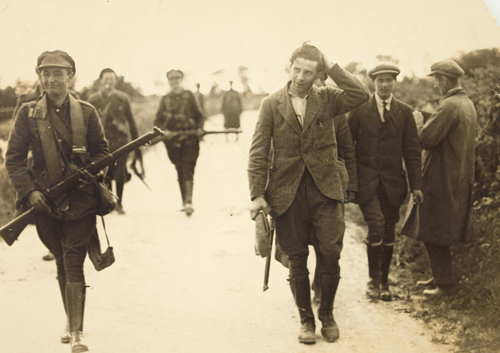Kerry a hotbed of anti-treaty resistance as fighting continues throughout country
Tralee, 27 September 1922 – Co. Kerry is emerging as the one of the principal strongholds of opposition to the Free State army in the ongoing civil war.
The resistance that has been mounted by Irregulars in the county is aided by popular local support.
While it is difficult to accurately gauge their strength, an Irish Times special correspondent estimates that up to 2,000 armed soldiers are available to the three Kerry anti-treaty brigades. This number is drawn from the local area and from men from other parts of the country who have come to help them.
While national troops have been successful in occupying some of the major towns, it is being reported that they have little hold beyond these and are unable to move safely from their barracks unless in large columns of 100 men or more.
Irregular troops, sometimes several hundred strong, can be seen roaming the countryside in open defiance of the army and they are regularly replenished with supplies and arms from vessels that move along the coast.
The Irish Times correspondent has highlighted the national army’s lack of manpower and equipment and suggested that their numbers need to be bolstered two or three-fold.
Despite its poor position in the county, a series of recent army operations led to the capture of some 60 Irregulars in Ballybunion, Finuge and Lixnaw.
Destruction of Derreen
In a letter to the Times newspaper in London, Lord
Lansdowne has written of the destruction of his property at
Derreen, near Kenmare. The house was well appointed with
furniture, linen, books and paintings. Derreen has been the focus
of repeated raids in recent months, according to Lord Lansdowne.
On 2 September, at approximately 1am, a gang of masked men broke
in and, after locking the gardener and his family in their
cottage, completely destroyed the main house. Only a shell now
remains.
Incidents around the country
Approximately 39 of around 440 anti-treatyite prisoners held in
Cork Gaol mounted an escape. During this incident, the guards
opened fire and two of the escaping prisoners were shot, with one
later succumbing to his injuries. To the west of Cork city, in
Macroom, a large group of Irregulars, believed to be under the
command of Erskine Childers, attempted to recapture the town only
to be rebuffed after four hours of heavy fighting.
In Sligo three dead bodies have washed ashore in the neighbourhood of Rahelly, which was recently a stronghold of the Irregulars. The bodies are understood to be those of Irregular soldiers who had attempted to escape capture by sea. The bodies have yet to be named.
The death has been announced of Seamus Devins, an anti-treaty TD for East Mayo and Sligo. Devins, a brigadier in the anti-treaty army, was killed during a battle in the mountainous area near Ballaghnatrillick. Another Irregular casualty is Brian MacNeill, son of Prof. Eoin MacNeill, Minister for Education. Brian was one of three of MacNeill’s sons who were active in the IRA during the War of Independence. The other two are currently serving as officers in the Free State army.
[Editor's note: This is an article from Century Ireland, a fortnightly online newspaper, written from the perspective of a journalist 100 years ago, based on news reports of the time.]





















